How To Prepare for English for CLAT | CLAT Mock Test Series 2026 PDF Download
The Common Law Admission Test (CLAT) is a national-level entrance examination for admission to undergraduate and postgraduate degree programmes in Law. As per the revised syllabus of CLAT issued by the consortium, the CLAT English Section questions range between 22 and 26 in a paper that consists of 120 questions. One can notice that the English language section forms roughly 20% of the overall CLAT syllabus.
Here is the table of the highlights of the CLAT Exam Pattern:
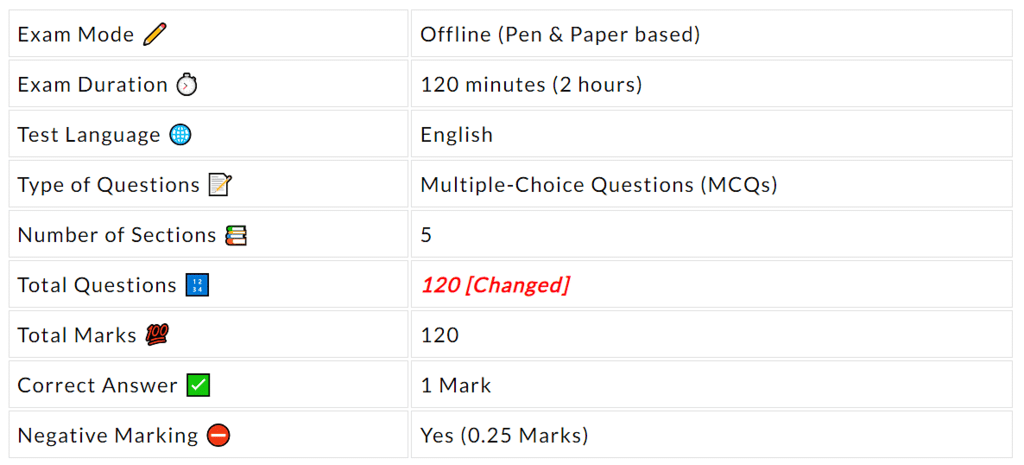
How to Prepare the English Language Section for CLAT?

The English Language section is crucial in the CLAT exam. This section tests the candidate's proficiency in English. Candidates can easily score well with the help of this section of CLAT. This subject demands mastery in all the CLAT English Language topics like-
- Grammar
- Vocabulary
- Reading Comprehension
Here are stepwise strategies compiled by EduRev Experts on the guidance of various CLAT toppers, which will help you to clear CLAT in an excellent manner.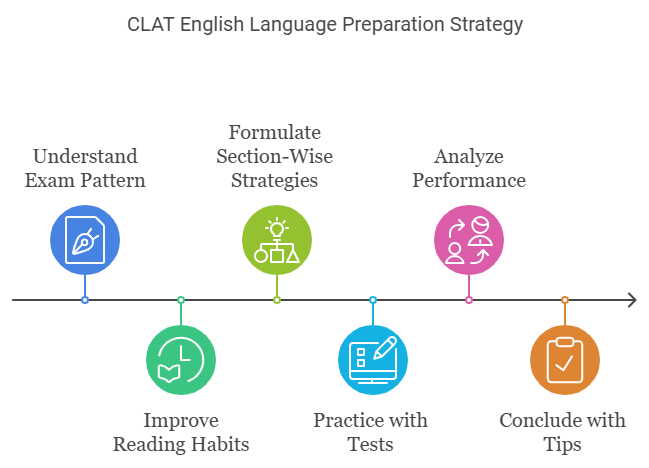
Step 1: Understand CLAT Exam Pattern, Important Topics & Type of Questions Asked.
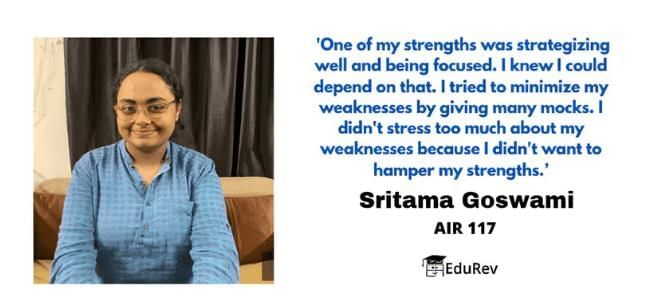
The CLAT English Language section is one of the biggest sections in the new CLAT Exam Pattern.
- The English Section of the CLAT exam aims to evaluate different aspects of English communication, such as reading comprehension, vocabulary, grammar, and the skill to interpret and analyze written texts.
- It includes 4-6 passages, with 22-26 multiple-choice questions in total.
- In this section of the UG-CLAT, you will be provided comprehension passages of about 450 words each.
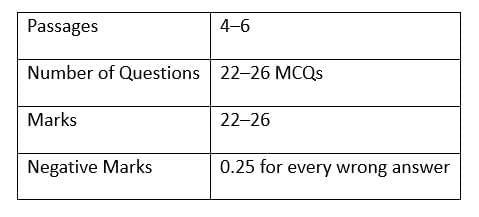 CLAT English Question Paper Pattern
CLAT English Question Paper Pattern
- These passages will be derived from contemporary or historically significant fiction and non-fiction writing and would be of a standard that a 12th standard student may be able to read in about 5-7 minutes.
- Each passage will be followed by a series of questions that will require you to demonstrate your comprehension and language skills, including your abilities to read and comprehend the main point discussed in the passage, as well as any arguments and viewpoints discussed or set out in the passage.
English Syllabus for CLAT
In this section of the CLAT English Language, you will be provided passages of about 450 words each. These passages will be derived from contemporary or historically significant fiction and non-fiction writing, and would be of a standard that a 12th standard student may be able to read in about 5-7 minutes.
Each passage will be followed by a series of questions that will require you to demonstrate your comprehension and language skills, including your abilities to:
- Read and comprehend the main point discussed in the passage, as well as any arguments and viewpoints discussed or set out in the passage;
- Draw inferences and conclusions based on the passage.
- Summarise the passage.
- Compare and contrast the different arguments or viewpoints set out in the passage, and
- Understand the meaning of various words and phrases in the context in which they are used in the passage.
Important Topics for English for CLAT
Here are some important topics for CLAT English:
Antonyms and Synonyms | Sentence Correction |
Adverb & Proverbs | One Word Substitution |
| English Comprehension | Fill in the Blanks |
Sentence Rearrangement | Spelling Check |
Idioms and Phrases | Foreign Language Words |
Step 2: Make your Foundation Strong by Improving Your Reading Habits

- Make a habit of reading every day: Don’t skip reading. This practice will help you enhance your vocabulary, spoken English and will also keep you well-versed with the important updates.
- Read newspapers daily: If you are at a beginner level, in that case, open the editorial page and read every passage of it. Sit at one place and read all the passages of that editorial page at one time without using your mobile phones, without simultaneously making notes.
- Clubbing News: Start with newspaper editorials, then club national news and editorials, as well as international news and editorials. If you are reading the editorial page, you can think about why the author has written this passage. And what is the takeaway about this author after reading this editorial page.
- Read any novel of your interest: One to one point five hours of reading is very important every day. Pick up a book of your choice. If fiction is your area of interest, start with it. Try to read a little faster by increasing your reading speed.
Step 3: Formulate a Section-Wise Concrete Strategy: RC, Vocabulary and Grammar
The main sections to include in this strategy are Grammar, Reading Comprehension, and Vocabulary.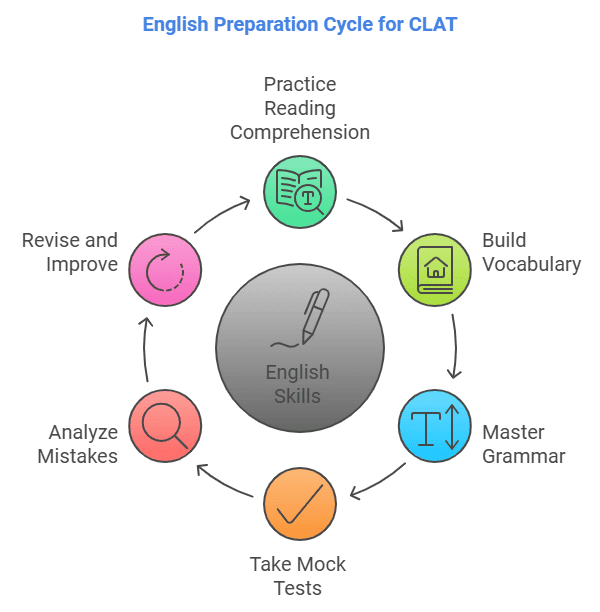
1. For Reading Comprehension
This section can be scoring if you do substantial practice and improve your reading speed. Around 18-24 questions based on Reading Comprehension are asked in every CLAT paper under the English section.
- Essential Skills for Mastering Comprehensions in CLAT: To excel in comprehensions, a CLAT aspirant needs five key skills: a strong vocabulary, the ability to discern the tone and purpose of passages or questions, an understanding of the number of passages in the exam and time management, the capacity to draw inferences, and the aptitude to connect, visualize, synthesize, gauge significance, and make inferences when addressing comprehension-based questions.
Here's how you could do that:
- Practice RCs daily: You have to practice RCs daily diligently, take out 30-35 minutes of your day for RCs only. Make sure solving RCs is the first thing you do in the morning or the first thing that you do in a day. You can practice RCs through mock tests
- Solving RCs at beginner level: If you are on the beginner level right now and you are able to solve only 3 or less RCs in mock test, then set a timer of 30 minutes and try to solve those 3 RCs with a lot of accuracy for the first week and consistently you can improve.
- Solving RCs at the intermediate level: Let’s say you are already on the intermediate level and are already solving 3-4 RCs but accuracy is not that perfect in that case you need to analyze.
- Analyzing RCs after solving is important: When you are practicing for RCs, even if you are doing 3 RCs or 4-5 RCs in 30-35 minutes you are supposed to analyze those RCs after practicing them. Check why your questions are getting wrong and how you can correctly solve them.
2. Vocabulary
The common vocabulary-based questions asked in the English Section are Synonyms, Antonyms, Idioms, Foreign language words, and Spelling
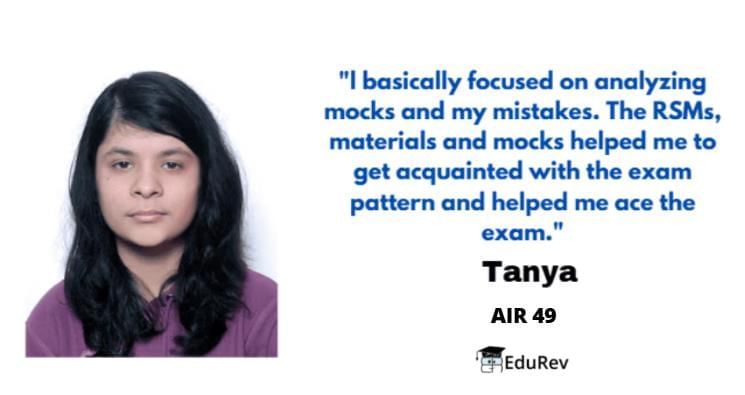
- Work on your Vocabulary: Whether you are good in vocabulary or weak in it, you should start your vocabulary exercise as early as possible. You can do that either by reading a book/ newspaper regularly. “Word Power made easy” by Norman Lewis is the best book for vocabulary preparation
- Solve quizzes: It is important to solve quizzes of synonyms, antonyms, and the meaning of words because merely memorizing the words won’t be of any help.
- Make a List: Every time, you read a new word anywhere, make sure that you add it in your list and look up its meaning and revise them periodically. Make sure not to put random words in the list.
- Bring the words to your usage: It is very difficult to retain the words we learn every day, so it is advisable to bring it to your usage and read sentences of those words, which will help you retain their meaning for a long time.
3. Grammar
This is one area where a lot of aspirants lose marks. One prime reason for this is the difference between our spoken and written English.
- Rules of grammar: To avoid errors in this section, students must thoroughly go through the Rules of grammar. What most aspirants do is follow the approach that sounds right. However, what you need to understand are the basic rules of Grammar.
- Practice the basics daily: The type of grammar questions asked is varied and may differ in every paper, so it is advisable to go through the basics of English grammar thoroughly and keep on practicing it daily.
- Apply rules to solve exercises: Capture the fundamental rules of grammar and then apply them to solving exercises under several topics.
- Strategic Focus: For Grammar, the foundational steps include investing in an essential grammar book such as Wren and Martin, meticulously studying each section, paying close attention to nuances, and building a strong foundation in English language fundamentals. Actively engage in constructing sentences in your mind, self-identifying errors, and correcting them to enhance your grammar skills
Step 4: Attempt Sectional Tests, Mock Tests, and Previous Year Questions
It is extremely important that you practice as many tests based on the English Language as possible.
English section, be it of any entrance exam, is almost always probable. The more you practice, the more you tend to get used to the questions and if you are lucky, you might find similar questions in CLAT.
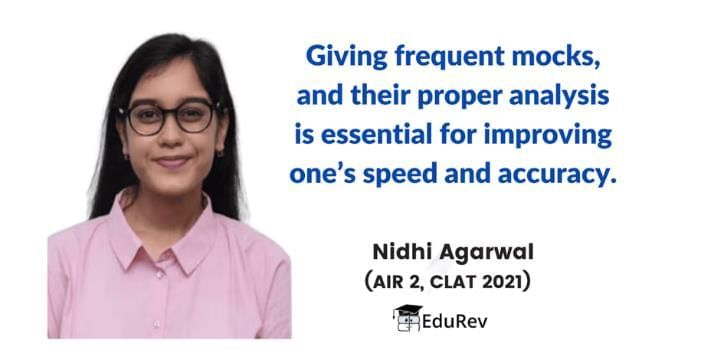
- Attempt Previous Year Questions: If you are weak or average in this section, you need to attempt the previous years' papers of CLAT examinations
- Sectional Tests and full-length mock tests: If you have written mock tests diligently throughout the year, then writing CLAT will be easy for you in the future because the paper is designed on the pattern of mock tests only.
- Follow a timetable for attempting tests: Give section-wise tests on weekdays and full-length mock tests on weekends. Follow a timetable and remember to add a slot for doubt sessions and revision.
- Analyze mistakes after giving mocks: Take mocks seriously, analyze your mistakes after giving one mock ,analyze where you are lagging, read more RCs, Practice more and then attempt another mock.
Check: CLAT Mock Tests - Don’t miss out on mocks: Don't miss out on mocks by thinking that your syllabus is still not completed; giving mocks will give you a chance to check your progress.
- Jot Down Anything that You Find Important: Don’t ignore this fact. It is always good to have a notebook filled with pointers. These are the pointers that will help you with the last-minute revision/preparation.
Do Not Waste Your Time on Multiple Sources: Especially for the English Language section, you must refer to just one good source. English Language books tend to have similar content, which aspirants often waste time on. Check out the detailed notes available on EduRev by clicking here.
Step 5: Keep in Mind these Concluding Tips
- Identify the specific areas in the English Language where candidates often encounter difficulties.
- Develop a solid understanding of effective strategies to tackle these challenging questions.
- Strengthen your grasp of the subject by practicing a variety of exercises and quizzes regularly.
- Cultivate a reading habit to expand your vocabulary, improve spoken English, and stay updated.
- Create a structured timetable that includes dedicated slots for doubt sessions and revision.
- Utilize the CLAT Mock Test Series as a valuable resource for exam preparation.
- Keep in mind that the English Language section constitutes just 20% of the total marks.
- Commit to daily practice with Reading Comprehensions and make sure to analyze your performance.
- Enhance your reading habits by engaging with newspapers or novels of personal interest on a daily basis.
- Dedicate time each day to build and enrich your vocabulary.
- Regularly attempt and analyze Sectional Tests, Mock Tests, and Previous Year Questions to refine your skills.
For aspirants who are well-versed in English, do not be overconfident and take this section lightly. This section carries 20% weightage with around 22-26 questions. Prepare well and your fluency in the language would be the icing on the cake. The candidates who are not as well-versed, with a defined strategy, positivity and enough practice, can undoubtedly score high in this section.
“GET UP, READ THE NEWSPAPER, PRACTICE, REPEAT” is the mantra to score well in the English section.
CLAT English Sample Questions
Each set of questions in this section is based on a single passage. Please answer each question on the basis of what is stated or implied in the corresponding passage. In some instances, more than one option may be the answer to the question; in such a case, please choose the option that most accurately and comprehensively answers the question.
Passage
In a letter written in January 1885 to his friend Pramatha Chaudhuri, Tagore spoke of the tension in his own mind between the contending forces of East and West. ‘I sometimes detect in myself,’ he remarked, ‘a background where two opposing forces are constantly in action, one beckoning me to peace and cessation of all strife, the other egging me on to battle. It is as though the restless energy and the will to action of the West were perpetually assaulting the citadel of my Indian placidity. Hence this swing of the pendulum between passionate pain and calm detachment, between lyrical abandon and philosophizing, between love of my country and mockery of patriotism, between an itch to enter the lists and a longing to remain wrapped in thought.’ Tagore’s mission to synthesise East and West was part personal, part civilizational. In time, it also became political. In the early years of the twentieth century, the intelligentsia of Bengal was engulfed by the swadeshi movement, where protests against British rule were expressed by the burning of foreign cloth and the rejection of all things western. After an initial enthusiasm for the movement, Tagore turned against it. His ambivalence was expressed in his novel Ghare Baire (Home and the World) and, more succinctly, in a letter written to a friend in November 1908, which insisted that ‘patriotism cannot be our final spiritual shelter’. ‘I will not buy glass for the price of diamonds’, wrote Tagore, ‘and I will never allow patriotism to triumph over humanity as long as I live. I took a few steps down that road and stopped: for when I cannot retain my faith in universal humanity over and above my country, when patriotic prejudices overshadow my God, I feel inwardly starved.
[Extracted, with edits and revisions, from Ramchandra Guha’s introduction to Nationalism, by
Rabindranath Tagore, Penguin Books, 2009.]
1.1 Which of the following best describes the two opposing forces that Tagore said he detected in
himself?
(a) A force encouraging him to write more, and a force encouraging him to paint more.
(b) A force encouraging him to travel widely, and a force encouraging him to travel only to the
West.
(c) A force encouraging him to join the national movement, and a force encouraging him to
take up arms.
(d) A force encouraging him to remain calm, and a force encouraging him to fight.
(Answer: (d))
Rationale:
The correct answer is (d) – A force encouraging him to remain calm, and a force encouraging him
to fight. This is apparent from the line in the first paragraph which states: ‘I sometimes detect in
myself… a background where two opposing forces are constantly in action, one beckoning me to
peace and cessation of all strife, the other egging me on to battle.’ There is nothing in the
passage to suggest that Tagore felt any force within himself encouraging him to paint more, nor to
travel only to the West, so neither (a) nor (b) is the correct answer. There is also nothing to
suggest that Tagore felt he had to choose between joining the national movement and taking up
arms, and so (c) is not the correct option either.
1.2 What does the phrase ‘enter the lists’ as used in the passage mean?
(a) To become contemplative and thoughtful.
(b) To become involved in a competition or challenge.
(c) To avoid interactions with other people.
(d) To avoid crowded places.
(Answer: (b))
Rationale:
The correct answer is (b) – to become involved in a competition or challenge. Tagore uses this
expression in contrast to ‘a longing to remain wrapped in thought’. Given this, and the general
meaning of the phrase ‘enter the lists’, none of (a), (c), or (d) can be the correct option.
1.3 Which of the following would be consistent with the author’s description of the swadeshi
movement in the passage above?
(a) Rejecting Western ideas and merchandise.
(b) Sending children to study in foreign universities.
(c) Rejecting Indian ideas and merchandise.
(d) All of the above.
(Answer: (a))
Rationale:
The correct answer is (a) – rejecting western ideas and merchandise. This can be inferred from
the author’s description of how ‘protests against British rule were expressed by the burning of
foreign cloth and the rejection of all things western’. Options (b), (c), and (d) are not consistent
with this description of the protests, and so none of these can be the correct option.
1.4 Which of the following best describes Tagore’s reasons for not letting patriotism triumph over
humanity?
(a) Universal humanity and love for one’s God are more important than love for one’s
country.
(b) Western science and technology are more advanced than Indian spiritualism.
(c) The West has a restless energy and will to action.
(d) Indian thought is peaceful and therefore opposed to action.
(Answer: (a))
Rationale:
The correct answer is (a) – universal humanity and love for one’s God are more important thanlove for one’s country. This is apparent from Tagore’s statements towards the end of the passage.There is nothing in the passage to support either (b) or (d). While Tagore mentions the ‘restlessenergy and will to action’ of the West, he does not provide this as a reason for not letting his
patriotism triumph over humanity.
Important FAQs related to CLAT English
Q.1. How can I improve my English for CLAT?
Ans: To sum up, for effective preparation for CLAT English, you must improve your reading habits, preferably by reading newspapers, revising grammar basics, and solving plenty of practice papers for CLAT.
Q.2. Is grammar important for the CLAT English Section?
Yes, all the questions will be based on a passage but the concept required for solving them remains the same. One needs to be fluent with the topics of English Grammar in order to score well in the CLAT English section.
Q.3. When should I start preparing for CLAT?
To answer the question, the ideal time duration of your preparation should be around one year. Start when you are at the end of your 11th standard. Be regular, cover a bit every day, and stay focused. Remember, you need time to create the best things.
Q.4. How can I learn vocabulary for CLAT?
Here are a few tips to help you learn vocabulary for CLAT:
Read Consistently
- When you read any word and its meaning, make sure to revise it again each day.
- Even when you pick up new words, try to revise the ones you read the previous day.
- Maintain consistency until you are perfect.
- No Mugging or Cramming
Do not mug up any words and their meanings.
- For this moment, you may remember it, but you will forget the words eventually.
- Mugging up is not a good practice.
- Read Fiction Books
Pick up fiction stories or novels to come across new words.
- Concentrate on the story while you read. You can even note down the new words while reading.
- You can also make a habit of looking up the meanings of these words and reading them.
|
1 videos|30 docs|71 tests
|






















